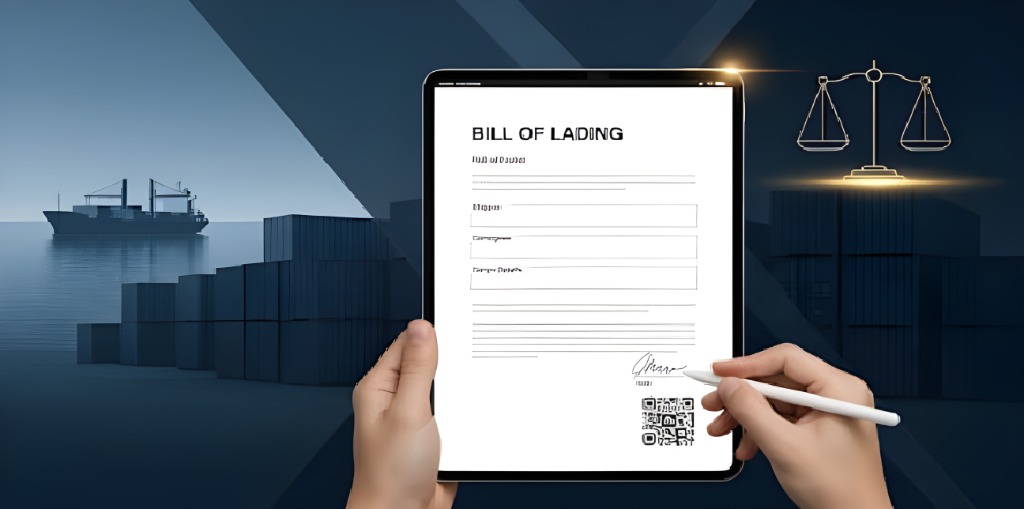The Bill of Lading Act 2025 presents a modern legal structure for trade and shipping in India. By strengthening the consignments and endorsements rights in the Bill of Lading Act 2025, the act ensures that property rights, liabilities, and legal safety are clearly defined in commercial transactions. For businesses engaged in international and domestic trade, understanding these provisions is important to ensure the safety and compliance of their interests.
What is the Bill of Lading Act 2025?
The Bill of Lading Act 2025 (Number 18 of 2025) cancels the Old Indian Bill of Lading Act, 1856, and introduces the updated provisions formed with today’s trade environment.
A bill of Lading serves as a contract for the vehicle between the carrier and the consignee for the goods. Traditionally, even though property in goods is transferred to another party, contractual rights often remain with the Shipper. The new Act corrects this imbalance by legally vesting rights and liabilities in the consignee or endorsee once property passes to them.
Key Provisions for Consignees Under the Bill of Lading Act 2025
The Bill of Lading Act 2025 explicitly provides that every consignee named in a bill of lading gains all rights of suit once the property in goods passes to them. This means,
- A consignee can directly enforce contractual rights against carriers.
- They are protected as if the contract had been originally made with them.
- They also inherit the liabilities of the consignee in bills of lading, such as obligations arising from freight or receipt of goods.
- This ensures that consignees have full control and accountability over the goods once they are shipped under their name.
Rights of Endorsees in Bills of Lading Transactions
In commercial practice, bills of lading are often endorsed to transfer ownership or rights to another party. The Bill of Lading Act 2025 clarifies that every endorsee’s rights in bills of lading include:
| Legal recognition as a contracting party. |
| Transfer of both rights of suit and liabilities once the property passes through endorsement. |
| Protection as a bona fide holder for value, even if the goods are not physically sent, they do not notice such facts. |
| This provision is safe against disputes that may arise during transit. |
How Property Transfers Through Consignment or Endorsement

The Act simplifies how property rights move:
- Consignment – When the goods are sent directly to a consignment, the property goes to them, as well as with all contractual rights and liabilities.
- Endorsement – When the bill is supported by the bill of lading, the property and the corresponding rights automatically move to the endorsee.
This clarity in the transfer of loading property bills ends confusion in multi-party transactions and provides a strong legal basis for ownership claims.
Liabilities of Consignees and Endorsees Under the Act
The Bill of Lading Act 2025 also balances rights with obligations. According to its provisions:
- The consignees and endorsers’ bills are subject to equal liabilities as they were the original contracted parties.
- These include responsibilities related to freight, handling fees, and acceptance of goods.
However, the Act protects the ability to stop traditional rights, such as to stop in transit and claim freight from the original shipper or owner. This ensures fairness on all sides in the shipping chain.
Why These Rights Matter in Modern Shipping and Trade
| To know more, visit dgshipping.gov.in |
Global trade thrives on certainty, and the bills of lading are central to this ecosystem. By updating the bills of legal provisions, you can get,
- In case of disputes, the right can be used without depending on the original shipper.
- A bill of lading is usually trusted as proof that goods were shipped, even if they weren’t actually loaded, unless it’s shown that fraud was involved.
- For shipping companies, traders, and legal professionals, these changes increase confidence in contractual obligations and reduce the risk of disputes.
Conclusion:
With the passage of the Bill of Lading Act 2025, India’s legal framework for trade has been established. This will provide a clear legal framework for the rights of the consignors under the bills of consignment and bills of lading, amending the legislative practices of shipment, bringing India into line with the global common (almost) law system, and improving the certainty of commercial documents.
As India expands in global trade, the Act not only ensures legal certainty but also complements the MTO registration system, creating a unified structure for multimodal transport. Together, they promote trust in commercial documents, simplify cross-border trade, and give Indian businesses a stronger stage in international commerce.
| Click Here to check the List of MTO Companies |
1. What is the aim of the Bill of Lading Act 2025?
The Act brings India’s trading and shipping laws up to date with modern business practices. It clarifies the obligations and rights of each consignor, consignee, and endorser. This will moderate disputes between them and improve confidence for commercial claims.
2. Who is a consignee in the Bill of Lading?
A consignee is either a person or a corporate body that has goods consigned for it. The Act has given the consignee full legal rights and responsibilities relating to the goods only once they are consigned to the consignee’s name.
3. What are the rights of a consignee under the Act?
The consignee can sue directly on all contracts made with carriers as if they received the contracts. The consignee can rely on the original contract as if they had signed it directly, and the consignee will also be liable for the terms of the agreement, such as payment of freight or acceptance of the goods.
4. Do endorsees have the same rights as consignees?
Yes. The endorsee becomes like a consignee once they are endorsed on the bill of lading, and assume the rights (like ownership and legal claims) and obligations (like freight amounts).
5. What does the Act do to protect endorsees?
The Act treats endorsees as parties to the contract. Further, it protects genuine holders by protecting their rights where no goods were either shipped or were not shipped, where missing or contraband were proved not to exist, unless it could be proved that fraud was involved in the shipping.

